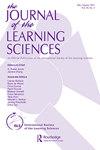Zones of mathematical play
IF 3.9
1区 教育学
Q1 EDUCATION & EDUCATIONAL RESEARCH
引用次数: 1
Abstract
ABSTRACT Most research on mathematical play and learning is focused on early childhood. This study examines how mathematical play and learning manifest in older children in a mathematical videogame designed by the first author, Rolly’s Adventure. We examined how players experienced mathematical play as they played Rolly’s Adventure, with a particular focus on failure paired with feedback. We used video and audio recordings of the players and their bodies, and screen capture of their gameplay. Spoken language, physical gestures, and digital actions were our primary sources of identifying, understanding, and triangulating mathematical play. We found that players pass through five zones of mathematical play that build upon each other and closely interrelate, and that these zones each involve different types of failure, feedback, and learning experiences. This paper provides a productive definition of mathematical play, introduces a framework that describes players’ mathematical play experiences, and presents five design principles that can be leveraged to support mathematical play.数学游戏区域
大多数关于数学游戏和学习的研究都集中在儿童早期。这项研究考察了由第一作者设计的数学电子游戏《Rolly’s Adventure》中,年龄较大的儿童如何玩数学游戏和学习数学。我们研究了玩家在玩《Rolly’s Adventure》时的数学体验,特别关注失败与反馈。我们使用了玩家及其身体的视频和音频记录,以及他们游戏玩法的屏幕截图。口语、肢体动作和数字动作是我们识别、理解和三角化数学游戏的主要来源。我们发现玩家会经历5个相互关联的数学游戏区域,每个区域都包含不同类型的失败、反馈和学习体验。本文提供了数学游戏的有效定义,介绍了描述玩家数学游戏体验的框架,并提出了可用于支持数学游戏的5个设计原则。
本文章由计算机程序翻译,如有差异,请以英文原文为准。
求助全文
约1分钟内获得全文
求助全文
来源期刊

Journal of the Learning Sciences
Multiple-
CiteScore
10.70
自引率
5.30%
发文量
17
期刊介绍:
Journal of the Learning Sciences (JLS) is one of the two official journals of the International Society of the Learning Sciences ( www.isls.org). JLS provides a multidisciplinary forum for research on education and learning that informs theories of how people learn and the design of learning environments. It publishes research that elucidates processes of learning, and the ways in which technologies, instructional practices, and learning environments can be designed to support learning in different contexts. JLS articles draw on theoretical frameworks from such diverse fields as cognitive science, sociocultural theory, educational psychology, computer science, and anthropology. Submissions are not limited to any particular research method, but must be based on rigorous analyses that present new insights into how people learn and/or how learning can be supported and enhanced. Successful submissions should position their argument within extant literature in the learning sciences. They should reflect the core practices and foci that have defined the learning sciences as a field: privileging design in methodology and pedagogy; emphasizing interdisciplinarity and methodological innovation; grounding research in real-world contexts; answering questions about learning process and mechanism, alongside outcomes; pursuing technological and pedagogical innovation; and maintaining a strong connection between research and practice.
 求助内容:
求助内容: 应助结果提醒方式:
应助结果提醒方式:


